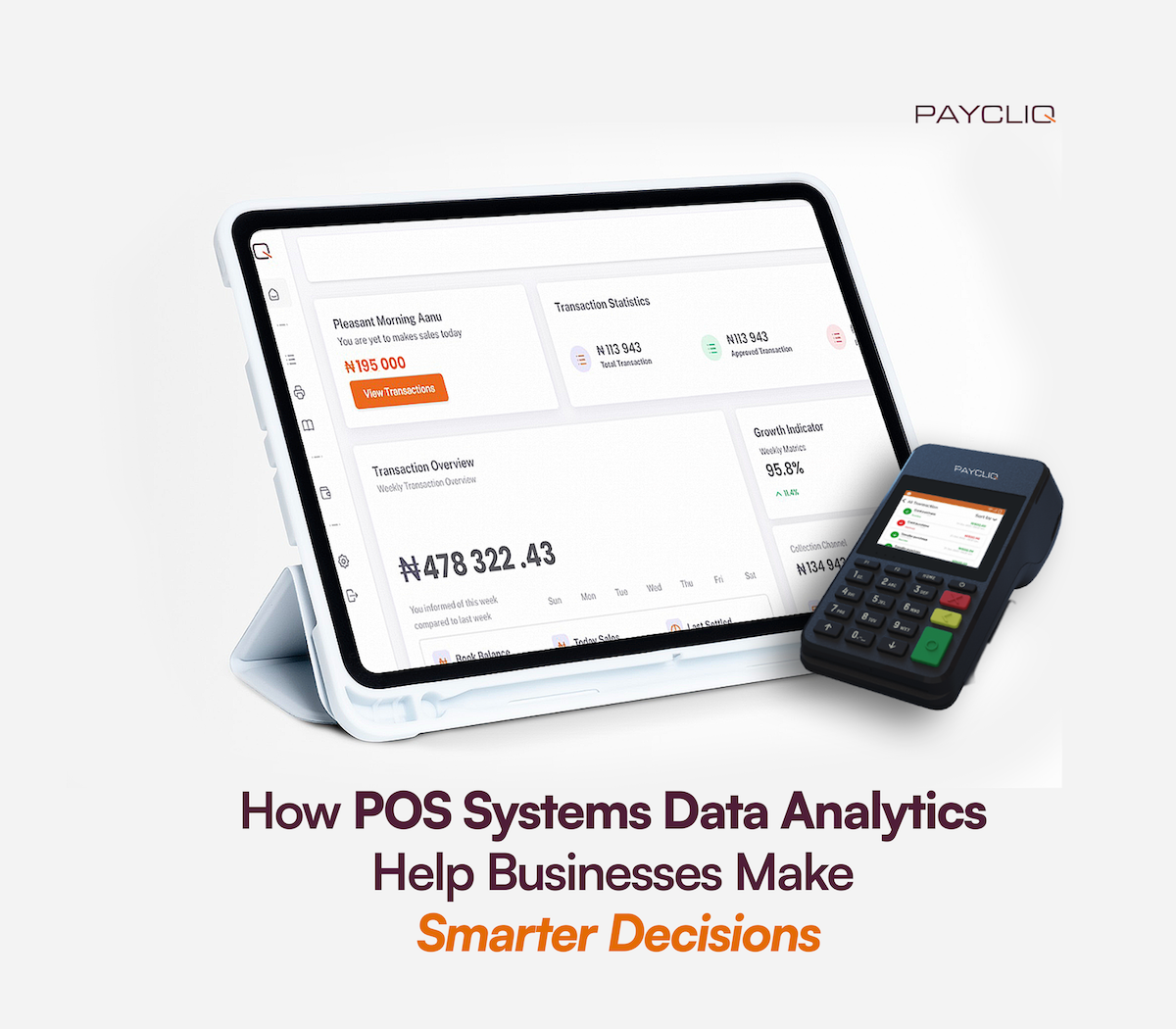Running a business in Nigeria today is not for the ‘faint-hearted’. The market competition is on the rise, and so are the changing customer expectations; the market has become too complex for guesswork. Business owners can no longer rely on “guesses” alone to make decisions about pricing, stock, or customer engagement.
Modern POS systems are functional beyond processing payments. Payment solutions like the PayCliq POS make transactions better. It can capture valuable sales data that can guide smarter decision-making. These systems have built-in analytics that turn everyday sales into insights. This empowers business owners to understand their customers, manage resources better, and drive long-term growth.
In this article, we’ll explore how POS systems’ data analytics can transform the way Nigerian businesses operate, the benefits of adopting such tools, and how real-world examples show their impact.
Understanding POS Systems Data Analytics
At its core, a POS system records every sale. Each transaction provides details such as what was purchased, when it was purchased, the quantity purchased, and even customer information when loyalty features are activated. While this data may seem ordinary at first, advanced POS systems organise it into clear reports and dashboards that give a full picture of business performance.
For example, a retail store in Ibadan could use a POS dashboard to identify which products sell best during festive seasons, or a restaurant in Lagos could track peak dining hours to plan staff schedules effectively. The key advantage is that raw numbers are transformed into insights that reveal
- Sales performance: Which products bring the highest revenue, and the ones that are underperforming.
- Customer behaviour: What customers prefer, when they shop most, and how often they return.
- Inventory management: Stock levels, fast-moving items, and deadstock that ties up cash.
- Employee productivity: Which staff members handle the most transactions and their efficiency level.
All of this knowledge gives Nigerian business owners the ability to make informed choices rather than reacting to problems after they arise.
Benefits of POS Systems’ Data Analytics
POS systems’ analytics deliver practical benefits that address common business challenges in Nigeria. Below are some of them;
1. Enhanced Customer Experience
Customers today expect personalised service. POS analytics help businesses identify buying patterns and preferences, which enable them to offer tailored discounts or loyalty rewards. For instance, if a customer frequently purchases baby products, a supermarket can send targeted offers in that category. It builds trust and encourages repeat purchases.
2. Better Inventory Management
Poor inventory planning can lead to overstocking, expired goods, or stockouts that frustrate customers. On the other hand, insights from POS data can help businesses track items that sell fast and the ones that remain unsold. A pharmacy in Abuja, for example, can use insights to ensure essential medicines are always available, while the slow-moving ones are reduced. This would reduce cases of expired medicines and wastage.
3. Improved Workforce Productivity
Often, some employees are always busy doing little or nothing and their performance directly affects customer satisfaction. POS analytics allow managers to monitor staff activity, measure transaction speed, and even spot training needs. If one cashier consistently handles fewer transactions than others, additional support or training can be provided.
4. Smarter Marketing Campaigns
Instead of spending blindly on advertising, POS analytics give business owners clarity on which campaigns work and which don’t. For instance, if sales data shows a spike during a specific promo, businesses can replicate that strategy. A provision store could discover that offering discounts on weekdays drives more sales than weekend campaigns. They can save money and improve ROI.
5. Increased Profitability
When businesses combine better customer experiences, improved stock control, and efficient staff management, they naturally see higher profits. Identifying top-selling products and focusing marketing efforts on them also increases revenue. Over time, the cost savings and sales growth from using POS analytics more than justify the initial investment.
Real-World Applications in Nigeria
To bring this closer to home, let’s imagine a Lagos-based supermarket using the PayCliq POS Systems. The owner of the super-market reviews weekly data and notices that soft drinks and snacks sell out quickly every Friday evening. He uses the insights to stock up ahead of Fridays and introduce a “Weekend Bundle” promo. Within a month, sales on weekends increase by 20%.
Similarly, a restaurant in Abuja may use POS data to discover that lunch hours between 12 pm and 2 pm are consistently the busiest. With this knowledge, they can schedule more staff during those hours to reduce waiting times, and keep customers happy and loyal.
Even small businesses like barbershops or beauty salons benefit can track peak times. They can adjust opening hours or run promotions during quiet periods to boost traffic. These real-world applications demonstrate that whether you’re managing a supermarket chain or a small shop, POS data analytics help you to make smarter decisions every day.
Our Take
The Nigerian retail business is fast paced and competitive and only those who adapt will thrive. Relying on instinct or outdated cash machines is no longer enough to stay ahead of the competition.
The real advantage is in transforming simple sales transactions into meaningful insights that improve customer relationships, streamline operations, and grow profits. For Nigerian entrepreneurs and SMEs, investing in modern solutions like PayCliq POS is about building a business that’s ready for the future.
Instead of running your business on guesswork, do it with data-backed precision.



What do you think?
It is nice to know your opinion. Leave a comment.